国际法双语课件8.Outer Space Law
空间法国际公法马工程教材ppt课件

2.应对各国开放,各国均可自由探索和利用,
行;
课件部分内容来源于网络,如有异 4.禁止将外层空间用于军事和战争目的 。 10
议侵权的话可以联系删除,可编辑
三、外层空间的法律原则和制度
(一)外层空间法的基本原则(P345) 第一,共同利益原则。 第二,自由探索和利用的原则。 第三,不得据为己有的原则。 第四,限制军事化的原则。 第五,援救宇航员的原则。 第六,国家责任和赔偿责任原则。 第七,对空间物体的管辖权和所有权原则。 第八,空间物体登记原则。 第九,保护环境原则。 第十,国际合作与互助原则。 第十一,遵守一般国际法原则。
课件部分内容来源于网络,如有异 议侵权的话可以联系删除,可编辑
9
现代国际法确认,外层空间的法律地位是: 1.外层空间不属于国家领土主权范围,不受
任何国家的管辖; 但不能成为任何国家、国际组织之间转让、 交换、买卖的对象,任何国家、实体不得垄 断或独占;
3.对外层空间的利用应为全人类谋福利而进
课件部分内容来源于网络,如有异 议侵权的话可以联系删除,可编辑 11
和平利用外层空间: 1.不在绕地球的轨道上放置任何带核武器或任何其他 类型大规模毁灭性武器的实体;不在天体装置这种武器; 不以任何其他方式在外层空间部置这种武器。
2.禁止在天体建立军事基地、设施和工事。. 3.禁止在天体试验任何类型的武器和进行军事演习。
课件部分内容来源于网络,如有异 议侵权的话可以联系删除,可编辑
14
(二)空间物体登记制度
1975年《登记公约》的规定,联合国秘书长保 持一份"外空物体总登记册"。发射国将其发射的空间物 体的下列情报向秘书长报告以便登记入册: 1.发射国或几个发射国的国名 2.空间物质的适当标志或其登记号码 3.发射的日期和地域或地点 4.基本的轨道参数(交点周期、倾斜角、远地点、 近地点) 5.空间物体的一般功能。
国际法课件 第八章 空间法

第一节 国际航空法
四、维护国际民用航空安全的法律制度
(四)引渡或起诉义务
引渡或起诉义务也称引渡或起诉原则,是指有权对违反国际法的某种特定行为行使管辖权的国家如果不 将被指控的嫌疑人引渡给请求国,该国必须将此案件提交其主管当局以便起诉。它是打击有罪不罚现象的产 物,《海牙公约》最早规定这种制度。该公约第7条规定,在其境内发现被指称的罪犯的缔约国,如不将此 人引渡,则不论罪行是否在其境内发生,应无例外地将此案件提交其主管当局以便起诉。该当局应按照本国 法律,以对待任何严重性质的普通罪行案件的相同方式作出决定。这种规定方式为《蒙特利尔公约》第7条 和《北京公约》第10条以及其他许多有关防止和打击国际犯罪尤其是恐怖主义罪行的公约所援引,被称为海 牙公式,或者恐怖分子无安全庇护所原则。2017年《中国、俄罗斯和印度外长第十五次会晤联合公报》强调 根据包括“遣返或起诉”原则在内的国际法义务及适用的国内法,将恐怖活动的组织者、实施者、煽动者和 支持者绳之以法。
第二节 外层空间法
二、外层空间的法律地位与基本法律原则
外层空间不同于国家领空,它不属于任何国家的主权范围。1961年联合国大会第1721号决议提出,外层 空间和天体供一切国家按照国际法自由探测和利用,外层空间和天体不得由任何国家据为己有。1963年,联 合国大会一致通过的《外空原则宣言》采纳了这项原则。《外层空间条约》以正式法律文件的形式确立了外 层空间供各国自由探索和利用的法律地位。
第一节 国际航空法
一、国际航空法的产生与发展
《国际民用航空公约》是现行有关国际航空的最广泛和最重要的国际法律文件,确立了有关现代国际航 空法的基本原则和规则,被称为国际民用航空活动的宪章性文件。该公约主要涉及空中航行的一般原则、航 空飞行、航空器国籍、便利措施、国际标准与建议措施以及航空运输等,并建立国际民用航空组织。中国是 该公约的原始缔约国之一。1971年11月19日,国际民用航空组织通过决议,承认中华人民共和国政府的代表 是中国的唯一合法代表。1974年2月15日,中国政府正式通知该组织,承认《国际民用航空公约》及其8个议 定书,并自同日起参加该组织的活动。从1974年9月起,中国一直被选为该组织理事会的理事国。
国际法课件
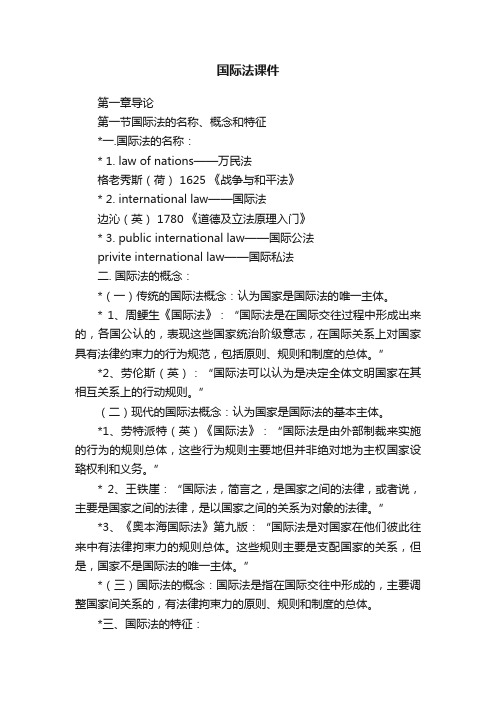
国际法课件第一章导论第一节国际法的名称、概念和特征*一.国际法的名称:* 1. law of nations——万民法格老秀斯(荷) 1625 《战争与和平法》* 2. international law——国际法边沁(英) 1780 《道德及立法原理入门》* 3. public international law——国际公法privite international law——国际私法二. 国际法的概念:*(一)传统的国际法概念:认为国家是国际法的唯一主体。
* 1、周鲠生《国际法》:“国际法是在国际交往过程中形成出来的,各国公认的,表现这些国家统治阶级意志,在国际关系上对国家具有法律约束力的行为规范,包括原则、规则和制度的总体。
”*2、劳伦斯(英):“国际法可以认为是决定全体文明国家在其相互关系上的行动规则。
”(二)现代的国际法概念:认为国家是国际法的基本主体。
*1、劳特派特(英)《国际法》:“国际法是由外部制裁来实施的行为的规则总体,这些行为规则主要地但并非绝对地为主权国家设臵权利和义务。
”* 2、王铁崖:“国际法,简言之,是国家之间的法律,或者说,主要是国家之间的法律,是以国家之间的关系为对象的法律。
”*3、《奥本海国际法》第九版:“国际法是对国家在他们彼此往来中有法律拘束力的规则总体。
这些规则主要是支配国家的关系,但是,国家不是国际法的唯一主体。
”*(三)国际法的概念:国际法是指在国际交往中形成的,主要调整国家间关系的,有法律拘束力的原则、规则和制度的总体。
*三、国际法的特征:*1、国际法的主体主要是国家。
*2、国际法是国家之间以协议的方式制定的。
*3、国际法的效力普及整个国际社会。
*4、国际法采用不同于国内法的特殊的强制实施方式。
*CASE 1955年7月27日的空中事件案(以色列诉保加利亚)第二节国际法的历史发展*一、国际法的形成和发展:*(一)古代阶段(公元5世纪西罗马帝国崩溃以前):萌芽阶段*1、最古老的《真珠条约》:公元前1296年由古埃及法老和古叙利亚国王签定。
国际法课课件

国际法课课件contents •国际法概述•国际法的主体与客体•国际法上的国家责任•国际法上的个人责任•国际法上的国际组织•国际法上的外交关系与领事关系目录01国际法概述国际法的定义与作用国际法的定义国际法是指在国际关系中,调整国家之间关系的法律规范和原则的总称。
国际法的作用国际法在国际关系中发挥着重要的作用,包括维护国际和平与安全、促进国际合作与发展、保护人权和基本自由等。
国际法与国内法的关系联系国际法与国内法都是法律体系的重要组成部分,二者在调整对象、法律渊源、实施方式等方面存在联系。
区别国际法与国内法在调整对象、法律渊源、实施方式等方面存在明显的区别。
国际法主要调整国家之间的关系,而国内法主要调整国家内部的关系;国际法的渊源主要是国际条约和国际习惯,而国内法的渊源主要是国内立法和司法判例;国际法的实施主要依靠国家自身的力量,而国内法的实施则依靠国家强制力保证。
国家主权原则国家主权原则是国际法的基本原则之一,它强调国家在国际关系中的独立地位和主权权利,包括领土完整、政治独立、经济自主等。
平等互利原则是国际法中的另一项重要原则,它要求各国在国际关系中平等相待、互利共赢,尊重彼此的主权和权益,促进国际合作与发展。
和平共处原则是国际法中的一项基本原则,它强调国家之间应该和平相处、互不侵犯、互不干涉内政,通过和平手段解决国际争端和冲突。
尊重人权和基本自由原则是现代国际法的一项重要原则,它要求各国尊重和保护人权和基本自由,促进人的全面发展和进步。
平等互利原则和平共处原则尊重人权和基本自由原则国际法的基本原则02国际法的主体与客体国家作为国际法的基本主体,国家享有国际法上的权利和义务。
国际组织包括政府间国际组织和非政府间国际组织,前者如联合国,后者如国际红十字会。
它们在国际法上享有一定的法律地位和权利。
争端解决机构如国际法院、国际海洋法法庭等,负责解决国家之间的争端。
国家领土外交关系海洋权益国际经贸关系01020304国家的领土完整和边界不可侵犯是国际法的基本原则。
航空法和外层空间法
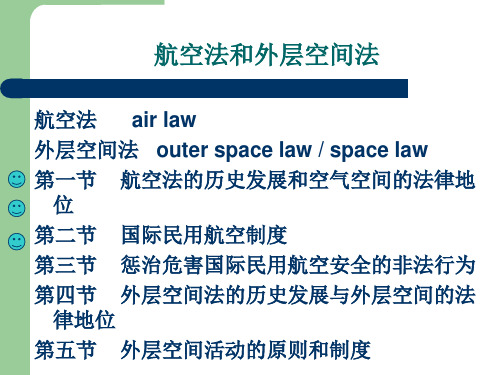
领空主权的内容
1、领空资源的排他主权:外国航空器的飞入须经 地面国家的许可 2、制定航空法律规章权 3、保留国内载运权 4、设立空中禁区
第一节 航空法概述和空气空间的法律地位
一、航空法——规定领空主权、管理空中航行和国 际民用航空活动的法律规范的总称。 调整对象:民用航空器 历史发展 1784 1903 1919《巴黎公约》确定领空主权——产生标志 1944 《芝加哥公约》——现代航空法的基础
航空法的渊源
主要是条约 (1)世界性多边条约 (2)区域性双边、多边条约 (3)其他条约
练习1
B.该类契约可以构成甲国国家对月球相关部分 主张主权的证据 C.即使该类契约受甲国国内法的保护,该所有 权在国际法上也不能成立 D.该类契约必须在联合国外空委员会登记,以 确立购买者在国际法上的所有权
练习2
甲国发射的气象卫星“雷公号”撞上了乙国飞行 的遥感卫星“神眼号”,造成“神眼号”卫星坠 落。“神眼号”的碎片撞上了丙国境内正在飞行 的丙国民航飞机,造成该飞机坠落。同时卫星碎 片还将丙国地面的一个行人砸死。甲乙丙三国都 是外空一系列公约的当事国。根据外空法的有关 制度,下列哪些表述是正确的?( ) A.甲乙两国对卫星碎片造成的丙国行人的损害 应承担绝对责任
4、 《东京公约》的管辖权——并行管辖体制 (1)航空器的登记国 (2)非航空器登记国的缔约国
(二)《海牙公约》
1、劫机行为(空中劫持)——任何人在飞行中的航 空器内使用暴力或暴力威胁或任何其他方式劫持 或控制该航空器,或企图从事上述行为,或对从 事或企图从事以上行为予以协助的行为。 2、特点 ①行为时间和地点:正在飞行中的航空器内 部发生的。②行为后果:既遂和未遂③行为主体: 直接从事劫持行为人和协助人。④行为表现方式: 目的在于劫持或控制航空器的各种行为 3、性质:在航空器内的犯罪行为
第八讲国际环境法pptPowerPointTempl

PPT文档演模板
北京理工大学 国际法
第八讲国际环境法 pptPowerPointTempl
2. 历史沿革
四个阶段,三个里程碑
v United Nations Conference on the Human Environment 1972年联合国人类环境会议
v United Nations Conference on the Human Environment and Development 1992年联合国环境与发展大会
v 国家资源开发主权原则和不损害国外环境原则
v (2)Principle of sustainable development v 可持续发展原则
PPT文档演模板
北京理工大学 国际法
第八讲国际环境法 pptPowerPointTempl
4 基本原则
v (3) Principle of common but differentiated responsibility
PPT文档演模板
北京理工大学 国际法
第八讲国际环境法 pptPowerPointTempl
1.国际环境责任的性质 (2)international liability国际责任
v International liability for injurious consequences out of acts not prohibited by international law.
第八讲国际环境法pptPowerPointTempl
PPT文档演模板
2020/11/30
第八讲国际环境法 pptPowerPointTempl
主要内容
v The Definition(定义) v The History(历史沿革) v Sources and System(渊源与体系) v Fundamental Principles(基本原则)
国际法教案课件—空间法

公约仅适用民用航空器,不适用于国家航空器。 一缔约国的国家航空器未经经特别协定或其 他方式许可,不得飞越另一国领土上空或在 此领土上降落。民用航空器则可按航空协定 的的规定飞越另一国领土上空或在此领土上 降落
2、航空器应有国籍(aircraft nationality), 在何国登记取得何国的国籍,航空器在一 个以上国家登记不得认为有效,其登记 可由一国转移至另一国。 3、国际航空飞行分为航班飞行(scheduled flight)和非航班飞行(non- scheduled
国家对其领土上空享有完全的排 他的主权,主要表现在以下几方面: 领空不得侵犯;(案例) 各国有权制订有关外国航空器在境 内飞行的规章制度; 各国保留国内载运权; 各国有权设立空中禁区,不分国籍 适用所有国家航空器。
苏联击落韩国客机案
(Korean Air Line Incident)
flight)。
非航班飞行权利和义务
航空器在缔约国之间有飞入、飞越或非运输业务性降停的 权利,即过境权(transit right ),缔约国有权命令其降 落。(在尊重国内载运权的前提下,从事非定期国际航班 飞行,上下乘客、货物、邮件)
双边航空运输协定?
航班飞行权利和义务
非经一缔约国特准或许可,不得在该国领 土上空飞行或飞入该国领土。
二、空气空间的法律地位
分为领空和领空以外的领域
各国领陆和领水的上空即领空
(territorial airspace) ,属于各国, 国家对领空享有完全、排他的主权。 领空以外,即专属经济区、公海和南 极等地的上空,其法律地位取决于各 区域的法律地位,各国在这部分空间 享有飞行的自由。
三、领空主权
国际公法学(第八章)

《芝加哥公约》仅适用于 “民用航空器”,不适用 于“国家航空器”。 【习题1】《国际民用航空公约》所指的航空器是 ( A )。 A. 民用航空器 C. 军用航空器 B. 国家航空器 D. 公务航空器
概念
类别
民用航空器 用于军事、海关和警察部 门的航空器之外的其他航 空器 适用 按航空协定的规定可飞越 另一国领土上空或在此领 土上降落
三、空气空间的法律地位 (一)有关空气空间权利的学说 国家领土的上空的法律地位,在第一次世界大战以前, 曾一度是争议的问题。主要有以下几种理论: 1.完全自由说。 2.有条件自由说。(国家有“自保权”) 3.海洋比拟说。(公空/领空) 4.国家主权论。 从1919年《巴黎航空公约》以来,现代国际法理论和实 践确立了国家对其领土上空的主权原则。
[教材P260]
主张地面上空是一个整体,应该用空间的功能作为标 准划界。目前,许多学者提出按航天器和航空器的不同功 能来确定其所适用的法律。
功能论是根据飞行器的功能和作用来决定适用的法律
,借以避开空气空间和外层空间在分界上的困难。此论以 美、英、荷等国为代表。许多有关外层空间的国际条约的
制订都考虑了功能论的观点。
颁布年份
协定名称 《关于管理空中 航行的公约》
简称 巴黎 公约
主要内容 第一个关于航空的国际公约,参加国26个,共43条。公约 首先确定了国家对于其领土上空具有排他的主权;其次, 公约确认,航空器的国籍取决于注册;成立“空中航行国 际委员会”。空中主权原则。 适用于其所定义的“国际运输”,即凡当事各方约定,始 发地和目的地分别在两个缔约国境内,或者在同一个缔约 国境内而在另一国有一个约定经停地点的“取酬性”运输 ,规定特殊的国际航空承运人责任规则,如推定过失责任 、无限制责任等
国际航空法

北京理工大学
国际法
李寿平
第一节 概述
3、空气空间与外层空间的界限在国际上尚未达成 、 一致的协定, 一致的协定,但一般认为其界限不能超过海拔 100公里。 公里。 公里 4、空气空间法的法律渊源既包括国内法也包括国 、 际法;外层空间法的渊源主要是国际条约。 际法;外层空间法的渊源主要是国际条约。
北京理工大学 国际法 李寿平
第三节 国际航空的基本法律制度 推定过失责任和责任限额制度
年海牙议定书: 华沙公约》 (2)1955年海牙议定书:对《华沙公约》的某些 ) 年海牙议定书 规定作了修改: 规定作了修改:提高限额 (3)1999年《蒙特利尔公约》:《统一国际航空 ) 年 蒙特利尔公约》 运输某些规则的公约》 运输某些规则的公约》
“犯罪”和“其他某些行为” 犯罪” 犯罪 其他某些行为” 飞行中” “飞行中”的航空器 航空器登记国原则” “航空器登记国原则”作为行使管辖权的基础
பைடு நூலகம்
(2)1970年《海牙公约》(Convention for ) 年 海牙公约》 the Suppression of Unlawful Seizure of Aircraft)
北京理工大学
国际法
李寿平
第四节 维护国际民用航空安全的法律制度 管辖权制度 非法劫持航空器( 非法劫持航空器(320页) 页 或引渡或起诉原则(aut dedere aut punire) 或引渡或起诉原则
(3)1971年《蒙特利尔公约》 ) 年 蒙特利尔公约》 (Convention for the Suppression of Unlawful Acts Against the Safety of Civil Aviation)
定期航班(scheduled international air service)与不定期航班 定期航班 与不定期航班 (non-scheduled international air service) 不定期航班飞行的权利: 不定期航班飞行的权利 without prior permission 定期航班的飞行许可: 定期航班的飞行许可 the special permission 国内载运权与禁区制度( 国内载运权与禁区制度(1983年韩国民用航班事件与芝 年韩国民用航班事件与芝 加哥公约第3条的修订 加哥公约第 条的修订)
新版国际法双学位课件知识点.ppt
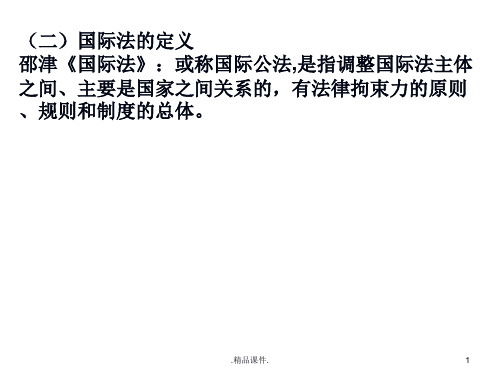
.精品课件.
34
2、时效:一国对某些他国领土进行安稳的占有后 就取得了该土地法律上的权利方式。
3、添附:由于自然力或人工的作用而形成的新的 土地,是国家增加原始领土的一种方式。
人工添附——围海造田 自然添附——沙流形成的三角洲
.精品课件.
35
4、割让——领土所有国根据条约将领土转移给其他 国家。
.精品课件.
26
三、外国人的待遇
(一)国民待遇(National Treatment) 1、概念:国家给予外国人与本国人相同的待遇。
其实质意义有两个方面: 一是外国人享有不低于本国人的待遇; 二是外国人不得要求高于本国人的待遇。 2、作用:保证一国内的内、外国人之间的地位平等。 3、特点: 1)互惠 2)具有一定的范围
如:1787年《美国宪法》第6条第2项规定: 在美国的权力下缔结的一切条约,与《美国宪 法》和根据该宪法制定的法律一样,都是美国最高 的法律......
.精品课件.
8
2、国际法与国内法的优先适用问题(地位) 1)条约优于宪法 (荷兰) 2)条约与本国法律处于同等地位,但低于
宪法。(美、英等) 3)国内法优先
强制性:一方非自愿情况下无代价转移领土主权。 非强制性:双方自愿情况下转移领土主权—交换、
买卖、赠与领土等。
5、征服——一国以武力占领他国的全部或一部分, 并迫使被占领国停止反抗,从而取得该领土主权的 方式。
.精品课件.
36
四、对领土主权的限制
(一)一般限制:依据一般国际法规则对所有国家 或大多数国家领土主权的限制。
引渡到第三国
.精品课件.
32
领陆——大陆、岛屿 领水——内水(内陆水域 + 内海水域)、群岛国的
国际法ppt
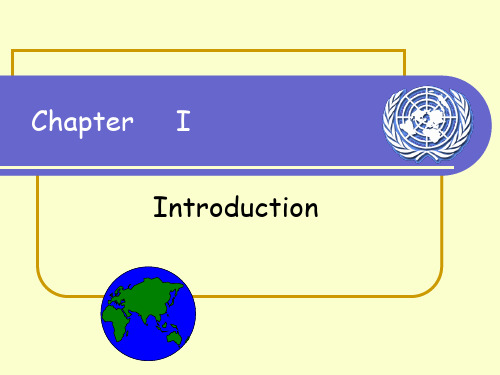
Bilingual Teaching of International Law
15
Early Origins
古代国际法 古代是否有国际法?这一直是一个争论的问题。 古代是否有国际法?这一直是一个争论的问题。 主流观点:难以产生完整的国际法体系; 主流观点:难以产生完整的国际法体系; 但是也存在着类似国际法的原则规则和制度。 但是也存在着类似国际法的原则规则和制度。 1、古代国家不是近代意义的主权国家 、 2、古代世界毕竟有类似国家的政治实体 、 3、雏形的国际法 、
国家 政府间国际组织
法的制定
争取独立的民族 立法机关;其他有权机关
国家之间;条约或习惯 强制实施机关 法的实施 国家自己实施;外来强制
Section 2
Historical Development of International Law
§1-14.Origins起源 of the modern system 古代和中世纪国际法 近代国际法 16世纪 世纪 Antiquity--- practice such as the exchange of emissaries 使节 the conclusion 缔结of peace treaties some of rules applicable to them 16th—17th ---international law(the law of nations)came into its own as a separate legal system or discipline学科 with the emergence出 现代国际法 20世纪初 世纪初
Bilingual Teaching of International Law
第七章 外层空间法 国际法

答案:C
• •
•
• •
1961年4月12日,苏联宇航员尤里·加加林乘坐东方1号航天器,绕地球飞行 108分钟后,胜利地完成人类历史上第一次宇宙飞行的任务。 1969年7月20日,美国宇航员尼尔·阿姆斯特朗(头盔中影像)和巴兹·奥尔 德林乘‚阿波罗‛11号飞船首次登上月球。 1981年4月12日,美国第一架航天飞机‚哥伦比亚‛号在肯尼迪航天中心首次 升空。 1984年6月7日,美国航天飞机‚挑战者‛号宇航员布鲁斯·麦坎 德利斯使用载人机动装臵,离开航天飞机320英尺,完成了人类首次无安全索 太空行走。 1995年2月6日,在距地面395公里的空间轨道上,美国‚发现‛号航天飞机与 俄罗斯‚和平‛号轨道空间站实现美俄两国航天飞行器械的历史性会合。在 此期间两者相靠距离最近达11.3米。 2001年4月30日,第一位太空游客、美国人蒂托(中)快乐地进入国际空间站
答案:CD
• 五、在月球和其他天体上活动的原则
• • • • • • 月球的非军事化 国际合作与互助 科学研究和探索 月球的环境保护 人类共同继承财产和国际开发制度买卖听证 月球大使馆CEO称绝不退款
• 在全球7个国家进行了25年的月球土地买卖有可能会在中国叫停。12月6日, 根据朝阳工商分局 作出的责令退回财物、吊销营业执照和罚款5万元的处罚 决定,在月球土地买卖听证会上,‚月球大使馆‛的首席执行官李捷和案件 调查员针锋相对,仍主张月球土 地买卖合法,并表示即使中国以后出现相关 法律也无法退款。目前,李捷已经起诉北京市工商局,海淀法院也已经立案。 • 申辩一 对月球没主权无权裁判 ‚中国人可以拥有月球土地‛,李捷一开 始他便语出惊人,随后不紧不慢地列举出他的两大依据。 • 第一个是1984年的《月球协定》,规定了‚月球的表面、表面下层或其任何 部分以及其中的自然资源,均不应成为任何国家、政府间或非政府国际组织、 国家组织 或非政府实体以及任何自然人的财产‛,但由于中国没有加入该协 定,因此这一协定对中国没有约束力。 • 另一个则是我国1983年加入的《外层空间条约》,规定了‚任何国家不得通 过主权要求、使用、占领,或者依其他方式将包括月球在内的外层星体据为 己有‛。 ‚既然中国对月球没有主权,自然也就没有司法裁判权,中国的法 律自然就无法延伸到月球。如果说国家工商行政机关有权裁定月球土地所有 权的归属,那就意味着 中国政府变相地把月球据为己有,就违反了中国政府 已经签署的《外层空间条约》。‛ • 申辩二 无法律禁止月球土地买卖 公司出售的月球土地是通过购买取得所 有权(在美国月球大使馆有备案登记),没有损害国家、集体、第三人的合 法权益。 ‚如果在法律上没有相关的条例和法规规定‘买卖月球违法’,有 关部门就不能认定其不合法。‛
国际法实用PPT课件

国际法的基本原则
国家主权平等原则
各国主权平等,互不隶属,互不 干涉内政。
01
02
和平解决国际争端原则
03
国家之间在发生纠纷或争端时, 应当通过和平的方法予以解决。
04
不干涉内政原则
任何国家或国际组织,在国际关 系中,不得以任何借口干涉他国 内政。
善意履行国际义务原则
各国应善意履行其依国际法承担 的义务,不得以任何理由拒绝履 行。
国际人权法院的判例法
国际人权法院通过对涉及人权的案件进行审判,为人权保护提供了重要的判例法 依据。
区域性国际人权保护机制
欧洲人权保护机制
欧洲人权法院是欧洲最主要的人权保 护机构,负责对涉及人权的案件进行 审判,并作出具有约束力的判决。
非洲人权保护机制
非洲联盟通过《非洲人权和民族权宪 章》等一系列文书和机构来促进和保 护人权,如非洲人权和民族权委员会 和非洲法院等。
国际贸易法律制度
1 2 3
国际贸易术语解释通则
国际贸易术语解释通则是国际贸易中普遍适用的 规则,对贸易术语进行统一解释,有助于减少贸 易纠纷。
联合国国际货物销售合同公约
该公约规定了国际货物销售合同的成立、双方的 权利义务、违约救济等内容,为国际贸易提供了 基本的法律保障。
国际贸易支付与结算法律制度
跨国公司在全球范围内经营,必然与各国政府发生关系。一方面,跨国 公司要遵守所在国的法律法规;另一方面,跨国公司也通过与政府的合 作,寻求更多的商业机会和利益。
跨国公司的国际法律责任
跨国公司在经营活动中,如果违反国际法规定,侵犯他国利益或造成他 国损失,应承担相应的国际法律责任。这包括民事责任、行政责任和刑 事责任等。
国际环境法的渊源和体系
国际法课件全版学习课件
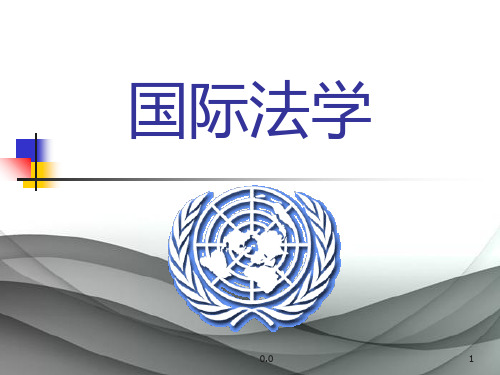
0.0
9
第一节 国际法的概念及特征
三、国际法的性质——国际法是法律的一个特殊 体系. 1、法学理论分析
——对法、法律的反思及法律规那么描述的解析 2、世界各国的国际法实践分析
0.0
10
第二节 国际法的开展
国际法开展的历史时期划分: 中古国际法——15、16世纪之前 近代国际法——1500—20世纪初〔以1648年威
4、主权原那么的意义.是各国保护自己生存、反对他国控制和干预 的法律盾牌.
0.0
23
互相尊重主权和领土完整原那么
5、互相尊重领土完整.领土完整是国家领土主权的表现, 国家之间相互尊重领土完整是尊重国家主权的最主要 内容.在国际法上,领土完整说明了领土整体性和统一 性的内在特征,指国家领土不能被分裂、肢解和侵占 的属性.领土完整是构成国家主权的重要局部,是鉴别 国家是否真正享有独立和主权的重
注意领会
互不侵犯原那么不仅反对大小规模的武装进攻,也制止进展 武力威胁、制止武装进攻的准备和进展战争的宣传.?纽伦 堡国际军事法庭规约?第5条规定,凡方案准备发动或从事 任何一种战争的行动都构成违反和平罪,是严重的国际罪 行.这里指出的当然是侵略性的非正义战争.
同?联合国宪章?一样,制止的是侵略战争,没有规定制止一 切战争,以下两类战争不在制止之列:1、联合国按照宪章 规定合法使用武力;2、在外国统治下的民族和人民为行使 自决权,为取得被剥夺的权利、自由和独立而进展的民族 独立解放战争,包括民族武装斗争和反对侵略的自卫战争.
二、前项规定不阻碍法院经当事国同意本‘公允及善良’原 那么裁判案件之权.〞
0.0
16
第四节 国际法的渊源
二、国际法的具体渊源 〔一〕条约 〔二〕国际习惯 〔三〕一般法律原那么 〔四〕确定法律原那么的补助资料 〔五〕公允及善良原那么 〔六〕国际组织、国际会议决议 〔七〕准条约、软法
- 1、下载文档前请自行甄别文档内容的完整性,平台不提供额外的编辑、内容补充、找答案等附加服务。
- 2、"仅部分预览"的文档,不可在线预览部分如存在完整性等问题,可反馈申请退款(可完整预览的文档不适用该条件!)。
- 3、如文档侵犯您的权益,请联系客服反馈,我们会尽快为您处理(人工客服工作时间:9:00-18:30)。
Satellites for International Direct Television Broadcasting ,
《各国利用人造卫星进行国际直接电视广播所应遵守的原则》 3.1986 Principles relating to Remote Sensing of the Earth from Space 《关于从外层空间遥感地球的原则》
《关于在外层空间使用核动力源的原则》 《关于开展探索和利用外层空间的国际合作,促进所有国家的福 利和利益,并特别要考虑到发展中国家的需要的宣言》, 简称 “1999年《外空国际合作宣言》”) 《空间千年:关于空间和人的发展的维也纳宣言》,对于促进空 间科技服务于和平目的,增进外空领域的国际合作,推动各国的经 济和社会可持续的发展,将产生积极的影响
Chapter 7
1.General
The origin of space law can be traced to the launching on 4 October 1957 of Sputnik I, the first artificial Earth satellite. Since that time the legal regulation of outer-space activities has been largely centered in the UN Committee on the Peaceful Uses of Outer Space. Satellites now control communications and observation networks, while landings have been made on the moon and information-seeking space probes dispatched to survey planets like Venus and Saturn. The research material gathered upon such diverse matters as earth resources, ionospheric activities, solar radiation, cosmic rays and the general structure of space and planet formations has stimulated further efforts to understand the nature of space and the cosmos.
Chapter 7
1.General
4.1992 Principles Relevant to the Use of Nuclear
Power Sources in Outer Space 5.1999 Declaration on International Cooperation in the Exploration and Use of Outer Space for the Benefit and in the Interest of All States, Taking into Particular Account the Needs of Developing Countries 6.1999 The Space Millennium: Vienna Declaration on Space and Human Development
of Astronauts, the Return of Astronauts and the Return of Objects Launched into Outer Space 1972 Liability Convention - Convention on International Liability for Damage Caused by Space Objects 1976 Registration Convention - Convention on Registration of Objects Launched into Outer Space 1984 Moon Agreement - Agreement Governing the Activities of States on the Moon and other Celestial Bodies
Chapter 7
1.General
1.
2. 3. 4. 5.
1. 外层空间条 约 Treaties 2. 营救协定 1967 Outer Space Treaty -Treaty on Principles Governing the Activities of States in the Exploration 3. 国际责任公 约 and Use of Outer Space, including the Moon and Other Celestial Bodies: forms the basis of international 4. 登记公约 5. 月球协定 space law 1968 Rescue Agreement - Agreement on the Rescue
Chapter 7
2.Basic Principals and Institutions
一、Basic Principals of Outer Space Law (1) Principle of common benefit. Outer space, including the celestial bodies,is considered to be the common heritage of mankind and all States shall have the right to explore and use outer space. (2) Principle of non-appropriation. No state is allowed to claim sovereignty over outer space or the celestial bodies like moon and other planets. (3) Principle of demilitarization. No State is allowed to use outer space for military purposes. such as construction of military bases fortress, carrying out military exercises or positioning weapons of mass destruction. (4) Principle of rescuing astronauts. Astronauts are seen as the envoys of mankind and all the Contracting States shall be under an obligation to rescue the astronauts in deneral
一、 Definition of outer space often simply called space,comprises the relatively empty regions of the universe outside the atmospheres of celestial bodies. Outer space is used to distinguish it from airspace and terrestrial locations. 二、Boundary between Earth's atmosphere and space there was no clear boundary between Earth's atmosphere and space, as the density of the atmosphere gradually decreases as the altitude increases. Nevertheless, several boundaries have been set, namely:
Chapter 7
1.General
自然科学上,外层空间一般是指地球表面大气层以外的 整个宇宙空间;在法律上,外层空间是指国家主权管辖 范围以外的整个空间及天体。 空间论:以空间的某种高度(物理特征和大气层空气分 布情况)作为标准来确定空气空间与外层空间的界限。 (1)空气构成说,有空气领域为“领空”,无空气为 外空 (2)地心吸力终止说,航天器进入太阳引力范围 (3)Kármán line ,altitude of 100 kilometers, Germanic Physicist ,established by Fédération Aéronautique Internationale,随技术变化而变化。 (4)地球静止轨道说,赤道平面垂直上空离地面约 36,000公里的环绕地球的圆形轨道 (5)有效控制说,国家的主权管辖范围以有效控制能 力为限 (6)航空器飞行的最高限度说 (7)人造卫星运行的最低限度说,空间论中赞成者最 多 功能论: 根据航天器和航空器的不同功能,确定所适 用的法律制度。
Chapter 7
1.General
Beginning in 1957, nations began discussing systems to ensure the peaceful use of outer space. Bilateral discussions between the United States and USSR in 1958 resulted in the presentation of issues to the UN for debate. In 1959 the UN created the Committee on the Peaceful Uses of Outer Space (COPUOS).COPUOS in turn created two subcommittees, the Scientific and Technical Subcommittee and the Legal Subcommittee. The COPUOS Legal Subcommittee has been a primary forum for discussion and negotiation of international agreements relating to outer space. 和平利用外层空间委员会 - COPUOS
